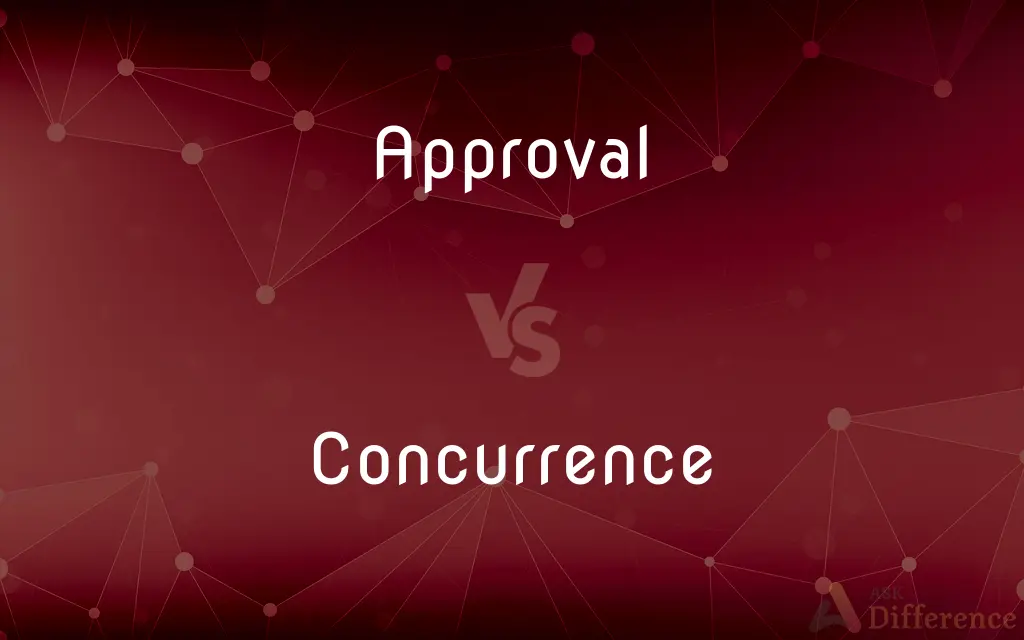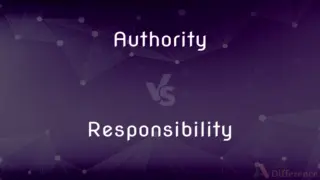Approval vs. Concurrence — What's the Difference?
Edited by Tayyaba Rehman — By Fiza Rafique — Updated on February 22, 2024

Difference Between Approval and Concurrence
Table of Contents
ADVERTISEMENT
Key Differences
Approval often comes from a hierarchical structure where a higher authority, like a manager or governing body, endorses or agrees to a proposal, decision, or action. It signifies a formal acknowledgment and often involves a process or criteria to be met. For instance, a project might need managerial approval before it begins.
Concurrence, on the other hand, involves agreement or alignment among parties on a certain matter, without necessarily implying a hierarchy. It's about simultaneous agreement or happening, often used in contexts where multiple stakeholders or entities need to be in sync. For example, in legal settings, concurrence might refer to judges agreeing on a decision.
Approval is often sought before an action is taken and serves as a form of permission, while concurrence may happen during or after a decision-making process, emphasizing unity or simultaneous occurrence. This distinction is crucial in collaborative environments where consensus is key.
The process of obtaining approval is generally more formal and might involve documentation, review, and adherence to specific standards or policies. In contrast, concurrence can be more informal, based on mutual understanding or shared goals, and might not require formal documentation.
Understanding the difference between approval and concurrence is important in various professional and personal contexts, as it helps clarify the nature of agreement required and the process involved in achieving it, ensuring that actions are taken with the appropriate endorsements or consensus.
ADVERTISEMENT
Comparison Chart
Definition
Formal sanction by an authority
Agreement or simultaneous occurrence
Hierarchy
Often involves a superior or authority
Usually among equals or in parallel processes
Process
Involves formal request and review
Can be informal or based on mutual agreement
Documentation
Typically requires documentation
May not require formal documentation
Context
Common in organizational, legal, and administrative settings
Used in collaborative, legal, and technical contexts
Compare with Definitions
Approval
Authorization for an action or process.
The city council's approval was needed for the construction.
Concurrence
Agreement or cooperation among parties.
Their concurrence was essential for the joint venture.
Approval
Official sanction of a plan or idea.
The project received approval after thorough review.
Concurrence
Simultaneous occurrence or alignment.
The concurrence of events led to the success of the launch.
Approval
Formal endorsement by an authority.
The committee gave its approval for the new policy.
Concurrence
Harmony or accord in opinion.
There was concurrence among team members on the strategy.
Approval
Agreement with a proposal or plan.
Her thesis received her advisor's approval.
Concurrence
Joint approval or consensus.
The board's concurrence was noted in the meeting minutes.
Approval
Acceptance of standards or criteria.
The design met with the client's approval.
Concurrence
Mutual agreement without formal authority.
Their concurrence on the matter expedited the process.
Approval
An official approbation; a sanction.
Concurrence
Simultaneous occurrence; coincidence.
Approval
The act or an instance of approving.
Concurrence
A common right; coincidence of equal powers; as, a concurrence of jurisdiction in two different courts.
Approval
An expression granting permission; an indication of agreement with a proposal; an acknowledgement that a person, thing, or event meets requirements.
I need to get an approval on this purchase order.
Concurrence
Agreement in opinion.
Concurrence
Cooperation, as of agents, circumstances, or events.
Concurrence
An instance of simultaneous occurrence.
Common Curiosities
Is approval always required from a superior?
Generally, approval implies a hierarchy and is sought from someone in a superior position or with authority.
What is the key difference between approval and concurrence?
Approval is a formal sanction by an authority, while concurrence is an agreement or simultaneous occurrence among parties.
Can concurrence imply endorsement?
Yes, concurrence can imply endorsement or agreement, but it typically lacks the formal authority aspect of approval.
Can concurrence occur among peers?
Yes, concurrence often occurs among peers or in parallel processes without a hierarchical structure.
Is approval specific to organizational contexts?
Approval is common in organizational, administrative, and legal contexts, but not exclusive to them.
Is formal documentation always necessary for approval?
Typically, yes, approval processes usually involve formal documentation and review.
Can concurrence lead to action without formal approval?
In some cases, concurrence among parties can lead to action, especially in less hierarchical settings.
How does approval impact decision-making?
Approval is often a prerequisite for decision-making, serving as formal permission to proceed.
Is consensus the same as concurrence?
Consensus implies general agreement among all members, while concurrence refers to agreement or simultaneous occurrence, which may not involve every member.
Do both terms imply agreement?
Yes, both terms imply a form of agreement, but the context and process differ significantly.
How is concurrence used in legal contexts?
In legal contexts, concurrence can refer to judges or legal entities agreeing on a decision or opinion.
Can approval be withdrawn?
Yes, approval can be withdrawn if circumstances change or if criteria are no longer met.
Can concurrence be informal?
Concurrence can be more informal and based on mutual understanding or shared objectives.
Does concurrence require unanimity?
Concurrence does not always require unanimity but does involve agreement among the involved parties.
Is concurrence enough to initiate a project?
Depending on the context, concurrence among key stakeholders can be enough to initiate a project, especially in collaborative or partnership settings.
Share Your Discovery

Previous Comparison
Scared vs. Afraid
Next Comparison
Authority vs. ResponsibilityAuthor Spotlight
Written by
Fiza RafiqueFiza Rafique is a skilled content writer at AskDifference.com, where she meticulously refines and enhances written pieces. Drawing from her vast editorial expertise, Fiza ensures clarity, accuracy, and precision in every article. Passionate about language, she continually seeks to elevate the quality of content for readers worldwide.
Edited by
Tayyaba RehmanTayyaba Rehman is a distinguished writer, currently serving as a primary contributor to askdifference.com. As a researcher in semantics and etymology, Tayyaba's passion for the complexity of languages and their distinctions has found a perfect home on the platform. Tayyaba delves into the intricacies of language, distinguishing between commonly confused words and phrases, thereby providing clarity for readers worldwide.














































